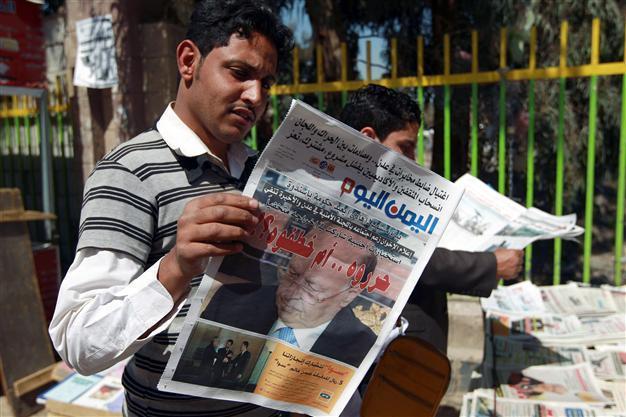Yemen's Hadi challenges Shiite 'coup' after fleeing Sanaa
ADEN - Agence France-Presse

A Yemeni reads a local newspaper whose frontpage shows President Abedrabbo Mansour Hadi on February 22, 2015, in the capital Sanaa. AFP Photo
Yemen's beleaguered Western-backed president escaped house arrest and fled the capital to friendly territory Feb. 21, labelling as a coup the grab for power by the Shiite militia that had held him.
An aide said presidential guards had sneaked Abedrabbo Mansour Hadi out of his residence in Sanaa, and that he later made it to the main southern city of Aden.
His supporters there have refused to recognise the authority of the presidential council installed by the Huthi militia to replace him, and Hadi himself called on world powers to "reject the coup".
In a statement, signed as president, he said all measures taken by the Huthis since they seized Sanaa in September and began a push to extend their control farther afield were "null and illegitimate".
The aide said Hadi will call on parliament to meet in Aden, as powerful tribes in the southern provinces of Marib, Jawaf and Baida urged him to declare Sanaa an "occupied city".
He said Hadi "remains the legitimate president and that he resigned under pressure from Huthis".
The president called for the national commission overseeing the drafting of a new constitution to create a federation to convene, saying it should meet in Aden or Taez province until Sanaa "returns as a safe capital for all Yemenis, and the withdrawal of all armed militia".
Hadi urged civil and military institutions to "abide by the decisions of the constitutional authority and to protect it, including above all the armed forces and security forces".
And he demanded an end to the "house arrest" of Prime Minister Khalid Bahah and other officials, urging Arab states and the UN Security Council to "protect the process in Yemen... and not to legitimise the coup in any way".
A source in the presidential force said Huthi gunmen at Hadi's Sanaa residence were tricked into looting a vehicle carrying arms while the president was sneaked out of a back gate.
The aide insisted that Hadi left "without an arrangement or even informing any of the political parties".
The security official in Aden told AFP that Hadi was staying in a presidential residence in the port city's Khormaksar diplomatic district.
The Huthis, whose power base is in the mainly Shiite northern highlands, overran Sanaa unopposed in September.
Last month, they seized the presidential palace and besieged Hadi's residence, prompting him to offer his resignation.
The Huthis have pushed their advance south and west into mainly Sunni areas, where they have met with fierce resistance from tribesmen and Al-Qaeda.
Hadi is a southerner who spent nearly three decades in the north, serving as defence minister and vice president. He became president in 2012 after long-time strongman Ali Abdullah Saleh was forced from power by a year-long uprising.
He has always defended the 1990 union of the north with the formerly independent south, where secessionist sentiment has risen sharply.
Most troops and militia in the area have pledged allegiance to him, and his supporters hailed his arrival in the former southern capital as a game-changer.
Nadia Sakkaf, Hadi's information minister, called for the revision of UN proposals for a political settlement that special envoy Jamal Benomar hailed only on Thursday as a "breakthrough".
"The political situation and the balance of power has changed after the arrival of Hadi in Aden," she wrote on Twitter.
Sakkaf said southern militiamen of the Popular Committees were ensuring Hadi's safety.
They have taken control of most police stations and checkpoints in Aden and clashed with special police they accuse of cooperating with the Huthis.
Benomar had been shuttling between the Huthis and their opponents for weeks trying to forge a settlement.
On Thursday, he said the parties had agreed on a new legislative authority to engage the Huthis and southern separatists in an "important step towards achieving a comprehensive political agreement that would end the current crisis".
But Sanaa talks aimed at ironing out differences were suspended Saturday because of "new developments", the representative of youth groups to the talks, Bassem al-Hakimi, told AFP.
"Hadi's exit has turned the table on all parties, especially those involved in talks," added political analyst Majed al-Modhaji.
Last weekend, the UN Security Council urged the Huthis to immediately and unconditionally engage in good faith in UN-brokered negotiations, withdraw their forces from government institutions and relinquish power.
It also demanded that the militia release Hadi, Prime Minister Khalid Bahah and other officials and activists under de facto house arrest or in detention.
